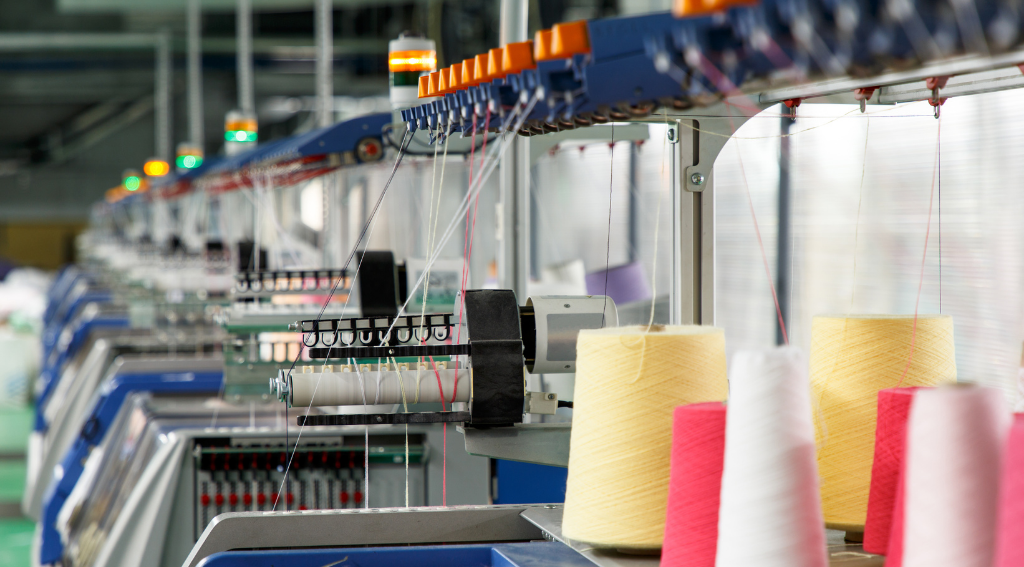If you’re wondering “Is recycled polyester sustainable and environmentally friendly?”, we’ve got you! We all know that recycled fabrics are a fantastic way to reduce waste and minimize our impact on the environment. But, is recycled polyester toxic or safe? Can it really be the green solution we’ve been searching for? Let’s find out.
Is Recycled Polyester Sustainable?
It’s no secret that around 50% of the clothes we wear are made from polyester – and, unfortunately, that number is expected to nearly double by 2030, according to Greenpeace. So, what’s fueling this polyester craze? Unsurprisingly, the whole athleisure vibe! People want comfy, stretchy, and durable clothes, and polyester fits the bill. But here’s the catch: polyester isn’t exactly an eco-friendly fabric. It’s actually made from polyethylene terephthalate (PET), which is essentially the most common plastic in the world. Our clothes are, for the most part, derived from crude oil.
The extraction and processing of fossil fuels are environmentally damaging and contribute to air and water pollution. If that wasn’t enough, the manufacturing process of polyester is energy-intensive, releasing significant amounts of greenhouse gases into the atmosphere. To top it all off, Polyester fabrics shed microfibers during washing, which are tiny plastic particles that end up in water bodies. These microfibers are harmful to marine life and can eventually enter the human food chain. It’s not biodegradable either which means that it persists in the environment for a very long time.
In an effort to green-ify the fashion industry, brands started choosing recycled polyester. Recycled polyester is made by giving new life to old plastic bottles or other polyester garments that would otherwise just add to our planet’s waste. This way, we’re reducing plastic waste and using less energy compared to creating polyester from scratch. Plus, recycled polyester keeps those plastics out of our oceans and landfills. It’s a small step that makes a big impact in the fight against waste and pollution.
So, at first glance, this fabric seems pretty good. But, really, is recycled polyester sustainable? And if so, why is recycled polyester considered a sustainable textile? How is it made? Is it toxic or safe? In otter to understand this fabric, we first need to understand the manufacturing process. Let’s get into it.
How Is Recycled Polyester Made?

The manufacturing process of recycled polyester fabric is far from simple. First off, plastic bottles are collected from various sources like recycling bins or waste collection centers. These bottles are then meticulously sorted to ensure they meet quality standards and are free of contaminants. The sorted bottles are thoroughly cleaned and sanitized to remove any impurities. After the cleaning process, the bottles are shredded into tiny pieces, resulting in small plastic flakes. Next, these plastic flakes are heated until they melt into a thick, gooey liquid. This liquid is then pushed through a device called an extruder, creating long, thin strands of polyester. As these strands cool down, they harden into solidified threads, which are then chopped into small chips or pellets.
These chips are reheated and melted once again, transforming them into a molten liquid. This liquid is then forced through a spinneret, which is like a showerhead with lots of tiny holes. As it emerges from these holes, it cools and solidifies into long, thread-like fibers.
These newly formed fibers are then spun into yarn, which can be woven or knitted to create various recycled polyester fabrics like shirts, jackets, or other clothing items.
Voilà! We’ve just turned old plastic bottles into a fresh, sustainable fabric that’s ready to make a fashion statement. Still, we aren’t sure about one thing: is recycled polyester environmentally friendly and sustainable?
Is Recycled Polyester Sustainable?

Recycled polyester is considered more sustainable compared to conventional, virgin polyester. It keeps plastics from going to landfills and the ocean and the fabric is as good as virgin polyester, but takes less resources to make. However, it does have some drawbacks as well.
The benefits of recycled polyester fabric
Recycled polyester is amazing at rescuing plastics from a bleak fate in landfills and the ocean. Plastic, which never naturally biodegrades, finds a second life as a fashionable, eco-friendly fabric instead of polluting our precious marine ecosystems which is a huge plus.
The scale of the plastic problem is mind-boggling. Each year, a staggering 8 million metric tons of plastic make their way into the ocean, joining the estimated 150 million metric tons already circulating in marine environments. If we don’t curb this trend, experts warn that by 2050, the ocean could be home to more plastic than fish. The impact on wildlife is devastating; plastic ingestion by seabirds and sea turtles is distressingly common because they mistake plastic for food.
Landfills, too, bear the burden of our plastic addiction. In the US alone, landfills received a whopping 26 million tons of plastic in 2015, a number that’s echoed across the European Union annually. Clothing plays a significant role in this problem. A UK report by the Waste and Resources Action Programme (WRAP) revealed that about 140 million pounds worth of clothing find their sad end in landfills every year.
As we mentioned earlier, the recycled polyester fabric can easily rival virgin polyester. Studies, like the one by the Swiss Federal Office for the Environment in 2017, have shown that producing recycled polyester consumes a whopping 59% less energy compared to creating polyester from scratch. That’s a significant energy-saving victory right there! Moreover, the production of rPET can reduce CO2 emissions by an impressive 32% compared to regular polyester, as estimated by WRAP.
What’s even cooler is that recycled polyester helps lessen our reliance on crude oil and natural gas, which are the primary raw materials for creating virgin polyester. By using recycled polyester, we’re giving a second life to materials that would otherwise end up as waste, curbing our petroleum dependence, extending landfill life, and reducing harmful emissions from incineration. Truly, recycled polyester is a game-changer in the textile industry. But, still, the question “is recycled polyester environmentally friendly?” is a bit complicated.
Is Recycled Polyester Environmentally Friendly?
Recycled polyester is not the most environmentally friendly fabric. While recycled polyester, or rPET, offers sustainability benefits, it’s important to recognize that the recycling process itself also has its environmental implications.
Mechanical recycling of PET can result in varying chip colors, ranging from white to creamy yellow. This color inconsistency poses challenges in achieving uniform dye uptake during the coloring process. Some dyers resort to chlorine-based bleaches to achieve the desired white color, leading to additional chemical use and potential environmental impact.
Then, there’s the issue of “Antimony Leaching.” Antimony, a substance used as a catalyst in making PET bottles and polyester, can potentially leach from PET bottles. While health agencies indicate that the quantities are generally too small to be considered toxic, there are concerns regarding its potential carcinogenic properties. Finding alternatives to antimony remains a challenge in the recycling process.
Is recycled polyester sustainable and environmentally friendly when it comes to microplastic pollution? Unfortunately no. When clothing items made from polyester, whether virgin or recycled, are laundered, they shed microscopic fibers that are too small to be filtered by wastewater treatment plants. These microfibers eventually make their way into rivers, oceans, and other water bodies. Research, such as the study from Plymouth University, highlights the magnitude of this issue. A single cycle of a washing machine can release a vast number of microfibers into the environment, contributing to the growing problem of microplastic pollution. The concerning aspect is that both virgin and recycled polyester garments contribute to microplastic pollution. It’s a pervasive issue associated with the nature of synthetic fabrics.
Is Recycled Polyester Toxic?
Recycled polyester itself is not inherently toxic. It’s made from the same polymer as virgin polyester (polyethylene terephthalate or PET), but the source material for recycled polyester is typically post-consumer plastic bottles or post-industrial waste. The recycling process involves cleaning, melting, and reforming these materials into new polyester fibers.
However, the potential for toxicity can arise from the dyes, chemicals, or additives used in the manufacturing and processing of recycled polyester fabric. The presence of harmful substances can vary based on the specific recycling and manufacturing processes, as well as the regulations in place within the country of production.
To mitigate potential toxicity concerns, various certifications and standards have been developed to ensure that recycled polyester (and textiles in general) meet certain safety and environmental criteria. These certifications include Oeko-Tex Standard 100, Bluesign, Global Recycled Standard (GRS), and Cradle to Cradle Certified, among others.

Is Recycled Polyester Safe?
It depends. However, it’s essential to consider the entire life cycle of a product and the potential risks associated with the dyes, chemicals, or additives used in the manufacturing and processing of recycled polyester fabric. Some recycled polyester may undergo chemical treatments during production, including dyeing or finishing processes. It’s crucial to ensure that the chemicals used comply with safety and environmental regulations.
To make sure that your clothes are safe, look for products with certifications such as Oeko-Tex Standard 100, Bluesign, Global Recycled Standard (GRS), or Cradle to Cradle Certified. These certifications ensure that the fabric meets specific safety and environmental criteria.

Best Recycled Polyester Clothing Brands in 2023
1. ASKET
Price Range: $45-$260
Materials: 100% organic cotton, Tencel, Recycled Polyester, and cashmere
Not only does Akset demonstrate an enviable dedication to using recycled and natural materials, but also ensures fair labor practices by manufacturing these garments in fair trade-certified factories. What’s even more impressive? Each piece from their ethical men’s clothing collection comes with an Impact Receipt. This comprehensive receipt outlines the cost, traceability, CO2 emissions, and critical information about its production journey, including manufacturing, dyeing, and milling locations.
2. Taylor Stitch
Price Range : $13-$990
Materials: Organic Cotton, Recycled Poly & more
Taylor Stitch places a strong emphasis on circularity through its innovative Restitch initiative, showcasing a dedication to sustainability while maintaining a transparent approach to sourcing, manufacturing, and distribution. Hailing from California, this brand is renowned for crafting highly sought-after men’s shirting, outerwear, denim, and foundational pieces designed for enduring wear. They take pride in their material selection, prioritizing recycled and regenerative fibers, notably certified organic cotton, to contribute to a more eco-conscious fashion industry.
3. NAU
Price Range: $78 – $545
Materials:Recycled Polyester, Recycled Down, Alpaca Wool, Organic Cotton, PFC-free DWR, Merino Wool, Linen, Hemp, Tencel, Tencel Sun, Micromodal
Nau seamlessly blends ethical principles with high performance in men’s apparel, offering a harmonious choice between eco-friendliness and cutting-edge technology. Their commitment to sustainability is evident in their use of ten thoughtfully selected fabrics, prominently featuring recycled polyester. The brand ensures transparency by openly displaying fair labor practices and eco certifications on its website, reaffirming their dedication to ethical production. Additionally, Nau harnesses the potential of materials such as linen and merino wool, harnessing their natural properties to craft top-tier performance wear.
In conclusion, the sustainability of recycled polyester hinges on its various aspects and the broader context of the textile industry’s impact on the environment. Recycled polyester, often referred to as rPET, emerges as a promising eco-friendly alternative due to its potential to repurpose plastic waste and reduce the need for virgin polyester production. By diverting plastic bottles and industrial waste from landfills and oceans, recycled polyester addresses the critical issue of plastic pollution.
However, it’s essential to acknowledge that the production and use of recycled polyester are not entirely devoid of environmental concerns. The recycling process may still involve energy consumption and chemical treatments, raising questions about its overall sustainability. The release of microplastics during washing remains a shared issue with virgin polyester, contributing to the broader problem of plastic pollution in water bodies.
Make sure that all your cloothes are Oeko-Tex Standard 100, Bluesign, Global Recycled Standard (GRS), or Cradle to Cradle Certified. Or, better yet, choose natural materials like organic cotton or bamboo to help reduce the potential for exposure to harmful substances.
.

About Author
Konstantina Antoniadou
Freelance sustainability and fashion writer with an ongoing curiosity to explore new innovative technologies, and report on trends in “green” industries.




